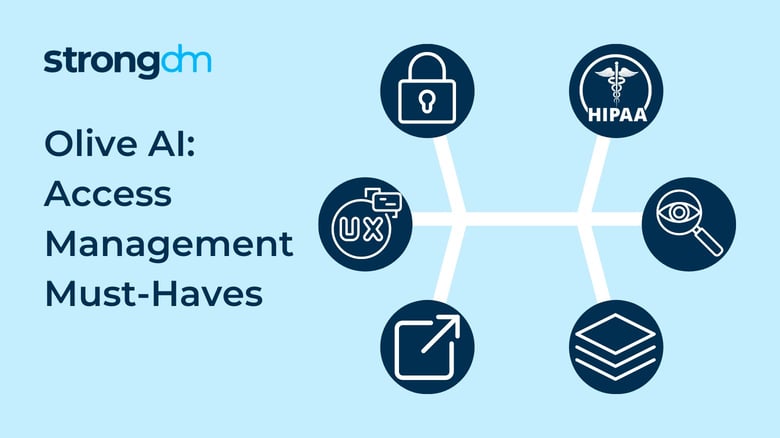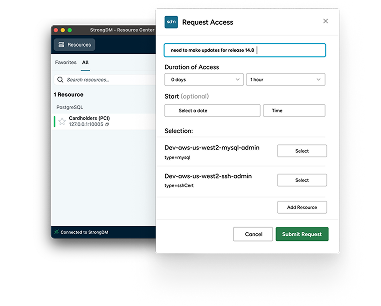How Olive AI Standardized Infrastructure Access in Order to Scale


Written by
Meghan StephanLast updated on:
August 29, 2024Reading time:
Contents
Built for Security. Loved by Devs.
- Free Trial — No Credit Card Needed
- Full Access to All Features
- Trusted by the Fortune 100, early startups, and everyone in between
During a featured session at this year’s DevOps Experience, Olive AI CloudOps Engineer Kellen Anker spoke with Justin McCarthy, StrongDM CTO & Co-founder, about his company’s journey towards achieving one-click onboarding access and the resulting radical improvements in workforce efficiencies.
A Textbook Case of Pain in the Access
Olive AI, a healthcare artificial intelligence company, has been on a steep trajectory of growth as it continues to expand inside and out, from its partner ecosystem to its customer base to its headcount. But not too long ago, the company’s exponential growth created exponential complexities that, in turn, led to exponential inefficiencies. Paradoxically, this predicament impeded the company’s ability to scale.
The heart of the problem: infrastructure access. As the number of employees grew, it became harder and harder to keep up with who needed access to which systems and to what extent and for how long. The number of VPN accounts multiplied, as did the number of one-off DB access requests, all of it exposing a profound bottleneck in productivity.
With high growth, comes onboarding access complexities. "The ability to audit who was doing what, where, and when became harder and harder," says Kellen Anker of @OliveAI__.#InfrastructureAccess#DevOpsExperience
— StrongDM (@strongdm) October 28, 2021
The Imperative to Standardize Access
Clearly, Olive AI needed a solution to rein in the chaos and implement order. The technical team couldn’t afford to spend so much time managing and curating YAML files. What’s more, as a HIPAA-compliant company, Olive AI was facing compliance and security gaps due to the state of its access landscape.
Kellen Anker knew that he needed a way to standardize infrastructure access in order for the company to scale smoothly. He sagely established the key components he needed in an access management solution:
- Security
- HIPAA-compliance
- Auditability
- Full-stack compatibility
- Scalability
- Frustration-free UX
- And no VPNs period
These requirements led him to StrongDM.
One-Click Onboarding Access Unleashes Productivity
Olive AI’s implementation of StrongDM led to a profound improvement in productivity and security. StrongDM gives Olive’s technical staff frustration-free and auditable access to everything they need across their entire stack, in a single place.
The hundreds of database accounts that once monopolized the technical team’s daily tasks were eliminated due to the simplicity that StrongDM provides. With StrongDM, the team can now provision, delete, and modify onboarding access with just one click.
StrongDM also brought huge improvements to the end-user experience, enabling new and existing employees to access the necessary tools and systems with the right permissions all from day one.
Importantly, StrongDM helps Olive uphold the compliance and security standards that are crucial to any business operating in the healthcare space.
Hungry for more details on Olive AI’s outstanding transformation? Watch the recorded session here.
StrongDM combines authentication, authorization, networking & observability into a single platform to enable fast, auditable access to everything technical staff need across your entire stack. See for yourself.
Next Steps
StrongDM unifies access management across databases, servers, clusters, and more—for IT, security, and DevOps teams.
- Learn how StrongDM works
- Book a personalized demo
- Start your free StrongDM trial

Categories:

About the Author
Meghan Stephan, Marketing Operations Analyst, is a marketing specialist with eight-plus years of experience in a variety of industries from sports and entertainment to technology. In addition to choreographing the operations and organization of the marketing team, Meghan teaches dance classes outside the weekly 9 to 5. She holds a bachelor's degree in Communication Studies from Medaille College. To contact Meghan, visit her on LinkedIn.
You May Also Like




